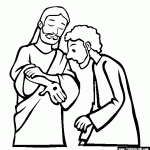Have you ever accidentally missed a big moment? It feels terrible! You got distracted right before your child scored a goal. You missed the winning touchdown because your cellphone rang. You were driving to the hospital to witness the birth of a grandchild, and the baby arrived before you did. Maybe you missed the two Popes being canonized this morning because you overslept. It’s a terrible feeling, and this is exactly how Thomas feels in today’s Gospel (John 20:19-31).
 Thomas misses the miraculous meeting with Jesus, and he understandably upset, frustrated and uncertain. In fact he says, “Unless I put my finger into the nailmarks and put my hand into his side, I will not believe.”
Thomas misses the miraculous meeting with Jesus, and he understandably upset, frustrated and uncertain. In fact he says, “Unless I put my finger into the nailmarks and put my hand into his side, I will not believe.”
Now, we don’t know much about Thomas, but he is mentioned twice before in the Gospel of John. The first time is when Jesus goes to Bethany, and his disciples don’t want him to go. They said, “Don’t you remember that the Jews tried to kill you there, and you want to go back?” But Jesus is going anyway. And out of all the disciples, Thomas stands up and says, “Fine. If you’re going, we’re going with you. We are not afraid to die with you.” What incredible statement of faith!
The second time is when Jesus tells his disciples that he is going to his Father and will prepare a place for them. He says, “Where I am going, you know the way.” The disciples are puzzled, but Thomas says, “Lord, we don’t know where you’re going, so how can we know the way?” Jesus says, “I am the way and the truth and the life. No one comes to the Father except through me.” Twice, Thomas’s response to Jesus is one of courage. Thomas is a man whose life is marked by faith, not doubt.
And yet today, Thomas is full of doubt, and he says what everybody else has been thinking, “No way! I watched him die! He can’t possibly be alive again.” Here is where Thomas starts to get a bad rap. He’s often called “Doubting Thomas,” as if he did something terribly wrong. And this raises the question for us: is it wrong to doubt?
There is a benefit of doubt. Sometimes we think of our faith as a castle – safe, comfortable, familiar. But what if God doesn’t want us to be comfortable and safe? What if being comfortable and safe actually keeps God at a distance?
Doubt tears down those castle walls and forces us out on a journey. It may feel like God is far away or absent when in fact doubt is a gift of God to move us to spiritual maturity. But we cannot be idle with our doubt, and it’s got to move us to action. Doubt is not a sign of weakness but a sign of growth.
Notice that Jesus doesn’t say to Thomas, “Why do you doubt? What’s wrong with you?” Instead, he meets him in the midst of his ocean of doubt and speaks life and truth and peace. Thomas has an encounter with the Risen Christ, and he is never the same. Even at this point, Thomas could have failed to believe because proof does not create belief. Evidence helps nudge us toward belief, but it cannot create faith.
For example, if my wife Stephanie tried to prove her love for me with evidence, she couldn’t do it. She could show me pictures from our wedding, or remind me of the dates we went on or kiss me or buy me a present…but do these things prove that she loves me? No. I know she loves me because I know it in my heart – because I have experienced it. I compute the evidence in my head, but it rests in my heart. And it’s the same way with faith. Evidence is important, for our faith is not blind faith. But evidence only goes so far. Faith is, essentially, about trusting, loving and believing.
Thomas doubted, but he also wanted to believe, and this is important. If our hearts are angry and hardened toward God and we don’t want to believe, we won’t believe. But if our heart is open, God will shape, strengthen, and grow us in faith.
So how do we handle our doubts today? What can we do when we doubt?
First, we must continually put ourselves among people of faith. In other words, we have to go to church. When we are among the people of God and the stories of God, we will encounter God. If we have any doubts, church is exactly the place to be. We must resist the pull of doubt toward isolation, because this is where the danger lies. God did not design us to survive alone. We need to be with other faith-filled people.
Secondly, we must pray. It may seem odd to pray if we’re not sure God is even there, but when we are honest about what is going on in our hearts and listen, God can break through. God isn’t afraid of our doubts. He wants us to talk to him about them. And that is what prayer does – prayer opens our hearts to God.
Finally, we must spend time with Scripture. If you sometimes doubt this whole Christianity thing, I challenge you to read through the Gospel of John. Read through it slowly. Let it soak in. Ask God to reveal himself to you. He will, and it will change you forever!
So embrace your doubt. Don’t run away from it. Don’t fight it. Don’t think of it as the enemy. Welcome it as a gift. Pass through it patiently, honestly and courageously. Remember, when we are in doubt, we are in a period of transformation. God is teaching us to trust him, not ourselves, and God is leading us on an amazing journey of faith – and there’s no doubt about that!




